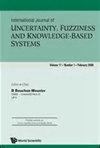An In-Depth Analysis of Autism Spectrum Disorder Using Optimized Deep Recurrent Neural Network
IF 1
4区 计算机科学
Q4 COMPUTER SCIENCE, ARTIFICIAL INTELLIGENCE
International Journal of Uncertainty Fuzziness and Knowledge-Based Systems
Pub Date : 2023-10-01
DOI:10.1142/s0218488523500344
引用次数: 0
Abstract
Autism spectrum disease is one of the severe neuro developmental disorders that are currently present worldwide (ASD). It is a chronic disorder that has an impact on a person’s behaviour and communication abilities. The world health organization’s 2019 study states that an increasing number of people are being diagnosed with ASD, which poses a risk because it is comparable to high medical expenses. Early detection can significantly lessen the impact. Traditional techniques are costly and time-consuming. This paper offers a Novel Deep Recurrent Neural Network (NDRNN) algorithm for the detection of the level of autism to address the aforementioned problems. The deep recurrent neural network is developed with several hidden recurrent network layers with Long-Short Term Memory (LSTM) units. In this work, Artificial Algae Algorithm (AAA) is used as a feature extraction algorithm, to obtain the best optimal features among the listed feature set. An Intelligent Water Droplet (IWD) algorithm is used for obtaining optimal weight and bias value for the recurrent neural network. The algorithm was evaluated for the dataset obtained by the Indian scale for assessment of autism. Experimental results shows that this proposed model produces the 91% of classification accuracy and 92% of sensitivity and reduces the cost.基于优化深度递归神经网络的自闭症谱系障碍深度分析
自闭症谱系疾病是目前世界范围内存在的严重神经发育障碍(ASD)之一。这是一种慢性疾病,会影响一个人的行为和沟通能力。世界卫生组织2019年的研究表明,越来越多的人被诊断为自闭症谱系障碍,这构成了风险,因为它与高昂的医疗费用相当。早期发现可以显著减少影响。传统的技术既昂贵又耗时。本文提出了一种新的深度递归神经网络(NDRNN)算法来检测自闭症的水平,以解决上述问题。深层递归神经网络由多个具有长短期记忆(LSTM)单元的隐藏递归网络层构成。本文采用人工藻类算法(AAA)作为特征提取算法,从列出的特征集中获得最优特征。采用智能水滴(IWD)算法求解递归神经网络的最优权值和偏置值。该算法通过印度自闭症评估量表获得的数据集进行评估。实验结果表明,该模型的分类准确率提高了91%,灵敏度提高了92%,并且降低了分类成本。
本文章由计算机程序翻译,如有差异,请以英文原文为准。
求助全文
约1分钟内获得全文
求助全文
来源期刊
CiteScore
2.70
自引率
0.00%
发文量
48
审稿时长
13.5 months
期刊介绍:
The International Journal of Uncertainty, Fuzziness and Knowledge-Based Systems is a forum for research on various methodologies for the management of imprecise, vague, uncertain or incomplete information. The aim of the journal is to promote theoretical or methodological works dealing with all kinds of methods to represent and manipulate imperfectly described pieces of knowledge, excluding results on pure mathematics or simple applications of existing theoretical results. It is published bimonthly, with worldwide distribution to researchers, engineers, decision-makers, and educators.

 求助内容:
求助内容: 应助结果提醒方式:
应助结果提醒方式:


